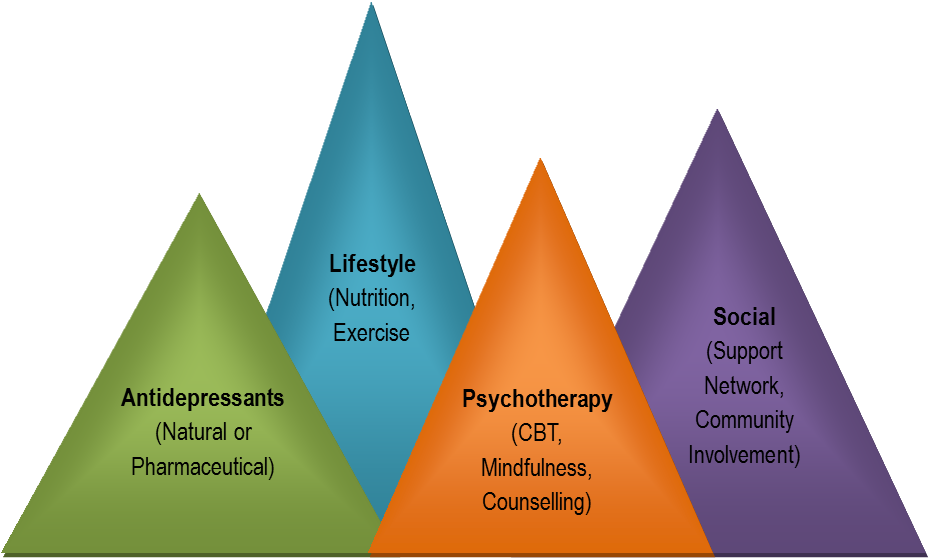Depression
Naturopathic Mental Health Toronto
It’s normal to have changes in mood; in fact this is part of being human. Mood fluctuations can help inform us that something is missing in our lives and that we should consider changing things. But clinical depression is worse than simple fluctuations in mood.
If you’re feeling stuck in a low mood, it’s important to ask for help. Clinical depression varies from severe to mild (feeling generally miserable or unhappy without really knowing why). It is a very ‘real’ illness (not just ‘in your head’) and deserves good treatment.
- Unhappiness, sadness or hopelessness
- Loss of interest in activities and in life
- Difficulty concentrating and making decisions
- Self-criticism and guilt
- Withdrawal from other people
- Irritability, anger or frustration
- Fatigue
- Sleep disturbances, including insomnia or sleeping too much
- Loss of appetite (or in some cases, over-eating)
- Suicidal thinking
- Self-harm, such as cutting or acting recklessly
- Many depressed people feel anxious as well (excessive worry, agitation, restlessness)
Depression is very common and can affect anyone, both male and female.
There isn’t one simple cause of depression; it’s influenced by many different factors:
- Stress buildup
- Brain chemistry
- Negative core beliefs
- Suboptimal nutrition
- Lack of social support
- Trauma
- Genetics
- Stress due to an illness
- Hormones. Depression can manifest with premenstrual syndrome (PMS), during pregnancy or in the post-partum period after delivery. Thyroid imbalances can also cause depressive symptoms.
- Seasonal changes. Seasonal Affective Disorder is a type of depression that manifests during the winter months.
- Previous episodes of depression. Once you’ve suffered once with depression, you’re more vulnerable to depression returning (relapse).
- Abuse of alcohol or recreational drugs
There are no specific tests for depression, therefore the diagnosis is made based on a thorough review of how you’re feeling. Medical questionnaires are often helpful in diagnosing depression and in monitoring your treatment.
To begin an assessment, click here for a questionnaire. Please bring this completed questionnaire to your initial consultation to review with Dr. Guthrie. (Please note, this questionnaire on its own cannot diagnose depression. Please consult with a professional).
The two main conventional treatments for depression are psychotherapy and medications. Your physician may prescribe drugs to help correct imbalances in neurotransmitters, such as serotonin, norepinephrine, and dopamine. It takes 2 to 4 weeks to build up to a therapeutic level of the medication, therefore other supportive measures may be prescribed in the short-term until the medication takes effect.
Psychotherapy is helpful when used together with medications or on its own in mild-moderate depression. Psychotherapy is also very helpful for preventing future relapses of depression.
The Naturopathic medical approach to treating depression is holistic, looking at the many aspects of mental and emotional well-being. Using herbal medicines, counseling techniques, acupuncture and/or nutritional supplements, Dr. Guthrie aims to:
- Improve mood, energy, motivation, ability to think clearly
- Support healthy hormone and neurotransmitter balance
- Build personal resilience using supportive counselling, cognitive behavioural therapy (CBT), mindfulness and meditation
- Improve stress management with a healthy lifestyle, often including exercise
- Use nutritional strategies to support mental health
Yes! If you’re currently taking prescription antidepressant medication we can use naturopathic medicines to safely provide additional support for you.
Dr. Guthrie can also work with you and your physician in helping you wean off antidepressants, if it is an appropriate time to do so.
Naturopathic medicine can be very helpful in safely minimizing withdrawal symptoms and providing ongoing care for relapse prevention.
In providing you with holistic treatment, Dr. Guthrie can guide and encourage you in gradually adopting these healthy habits:
- Regular exercise
- Eating nutritious foods
- Relaxation techniques
- Adequate sleep and rest
- Reducing alcohol and drugs of abuse
Dr. Guthrie is trained in Cognitive Behavioural Therapy (CBT), which is a well-researched and effective treatment for depression. CBT is a structured and practical form of therapy that works by identifying and addressing the behaviours and thinking patterns that cause and maintain depression. CBT can give you the tools to think more clearly, feel better and reach your individual goals such as increasing self-esteem, improving communication, or decreasing hopelessness and guilt. Most importantly, in CBT we aim not only to lift your current depression, but also to help you learn how to prevent depression from coming back.
To learn more about this effective treatment, please click here.
- If you or someone you know is having suicidal thoughts, get help right away.
Call 911, or in Toronto call 416-408-4357 (HELP). - Call to make an appointment at our clinic or with another health professional. It’s best to receive the help you deserve right away; don’t delay or suffer alone.

ALPS Model for Holistic Depression Treatment: Jerome Sarris
References: Treatment Plans and Interventions for Depression and Anxiety Disorders, The Guilford Press, www.mayoclinic.com, Clinical Naturopathy, Elsevier Australia.
